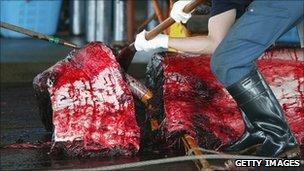Whaling: Reflections from Japan
- Published
- comments

Junichi Sato: Japan should spend money on the post-Fukushima recovery, not whaling
From the International Whaling Commission (IWC), external meeting in Jersey:
Last year, two Greenpeace activists, Junichi Sato and Toru Suzuki, were given suspended sentences by a Japanese court for having removed boxes of whale meat from a warehouse.
They were attempting to highlight perceived malpractice in the annual Antarctic whaling expeditions.
This week, as the IWC meets in Jersey, their appeal against their sentences, for theft and trespass, failed.
Meanwhile, Japan confirmed its plan is still to send the whaling fleet back into the Antarctic later this year.
But it has admitted that the main obstacles it faces is harassment from Sea Shepherd Conservation Society, external boats. Greenpeace also used to send boats to disrupt the hunt, but pulled out a few years ago.
Watching events from Tokyo, and looking back on the last three years, how does Mr Sato see the current situation regarding Japanese whaling?
And have the removal of the meat, the court cases and coverage in the Japanese media changed things in the country?
Here are his thoughts.
Richard Black: Japan's deputy whaling commissioner here, Joji Morishita, says the plan is still to head back to the Antarctic later this year - not to halt, as some observers have suggested. Do you think in fact it will happen - and why?
Junichi Sato: We do hope that these suggestions are just that.
Along with most Japanese people, I believe that all resources should be focused on the post-Fukushima recovery.

Greenpeace alleged embezzlement was rife in the Japanese Antarctic whaling programme
It is hard to see in these tragic circumstances that it makes sense to prioritise Japanese taxpayers' money for any whaling programme.
RB: Do you see any changes in attitudes to whaling among Japanese politicians - and if so, how might that influence things?
JS: Yes, much has changed within the Fisheries Agency of Japan (FAJ).
Just this past December, high-ranking officials admitted publicly, external to distributing choice cuts of whalemeat to officials and reprimanded five of them - vindicating the very claims for which I was prosecuted.
One of those reprimanded was Jun Yamashita, the number two civil servant at FAJ and a prominent negotiator at previous IWC meetings. He has since left FAJ. Such public apologies - which included a televised 90-degree bow - are rare in Japan.
RB: It appears that Sea Shepherd's actions have had a real impact on Japanese plans. In that light, do you think Greenpeace should have continued with its own expeditions to oppose the whaling fleet in the Antarctic?
JS: Whaling will be stopped where it began: here in Japan.
While I wish I had not been put on trial, the allegations against me and ensuing court case have helped raise public awareness about the corruption behind our dying whaling programme.
The more that the public of Japan are aware of how their tax yen are spent, the more likely that we are to see them demand an end to whaling. The FAJ's public admission helps illustrate this progress.
RB: The Institute of Cetacean Research (ICR), which runs the hunting programme, has been through a major change of management, with many of the ex-government officials swept away and replaced by a real scientist as the chief.
Do you think these changes can "clean up" the whaling operation, preventing the kind of issues that your investigation discovered?
JS: Of course, the best way ICR can "clean up" would be to shut down its commercial whaling, thinly veiled as "scientific research."
Greenpeace's investigation helped get some officials to leave ICR, but unfortunately not much will change until the entire programme is reviewed.
RB: Even though your appeal failed, do you think that the investigation you mounted, and the publicity resulting from it, has done anything to hasten the end of Antarctic whaling in Japan - and, in hindsight, would you have done anything differently?
JS: I do believe that by exposing the corruption at the heart of the whaling programme is the best opportunity presented to us to progress this issue inside Japan.
What encourages me most is the rise in activism in Japan in recent years - people openly questioning the government's decisions and policies.
I certainly cannot take credit for this alone, but if my trial and appeal have enabled this even in a small way, then the future for the Japanese people is brighter and makes it all worth it.